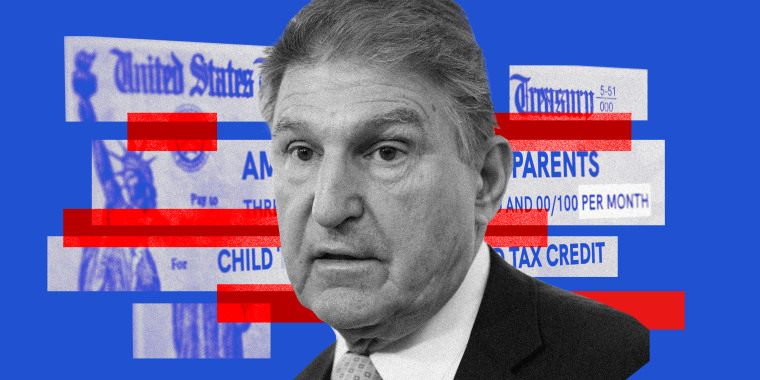Sen. Joe Manchin, D-W.Va, reportedly told colleagues privately in recent months that he believes his constituents would blow cash from the enhanced child tax credit on drugs instead of providing for their children. That belief would seem to factor into his attempt to strip the provision from President Joe Biden’s Build Back Better bill, a piece of legislation that would, among other things, extend those soon-to-expire monthly payments that began earlier this year. But the senator might find it sobering to consider data showing how much of a lifeline the tax credit has been for people receiving it.
As Bloomberg reported, U.S. Census Bureau data collected earlier this year found that people who received child tax credit payments overwhelmingly spent them on pressing necessities like food, rent, utilities, clothing and vehicle payments. According to another study by the Center on Budget and Policy Priorities, Black and Hispanic families were disproportionately likely to spend payments on education-related costs like school supplies.
The expanded child tax credit, which was signed into law in March through Biden's Covid-19 relief bill, gives two-parent households with up to $300 a month per child to assist with providing for children. Its first installment this summer lifted 3 million children out of poverty. Now nearly 10 million children are at risk of falling back below the poverty line or even deeper into poverty when the enhanced child tax credit are set to expire at the end of this month.
Manchin could presumably counter that this data wouldn’t allay his concern insofar as respondents to surveys won’t be honest about spending government aid on illicit drugs. But that’s a shortsighted, reactionary talking point that fails to account for the tremendous value of the program — including for people addicted to drugs.
Even if we were to grant Manchin’s point that the small percentage of Americans who are addicted to drugs would use some of the extra money on drugs, would that be a sound basis for entirely discarding an effective tool for smashing child poverty across the country, one which finally brings the U.S. in line with its peer nations that have long provided a child allowance? Moreover, does Manchin think that someone who has a drug addiction doesn’t need money to eat, pay the bills and achieve the stability that likely increases the likelihood of recovery?
Ironically Manchin’s much-discussed concerns about the Build Back Better Act going too far with social spending seems to stand in the way of helping his own constituents deal with substance use problems. West Virginia, one of the poorest states in the nation, has long struggled to modernize its fossil fuel-focused economy; the state has more to gain from the Build Back Better Act’s economic aid and job-creation programs than most. Even mine workers in the state are supporting the bill's climate policy provisions in the hope that displaced coal workers can find jobs in renewable energy.
Given the data on how economic hardship may drive people to cope with drug use, Manchin’s opposition to the Build Back Better Act should be seen as reinforcing the status quo of rampant drug misuse in his state. Passing the bill and its child tax credit provision would help build a brighter future in a place that badly needs it.

